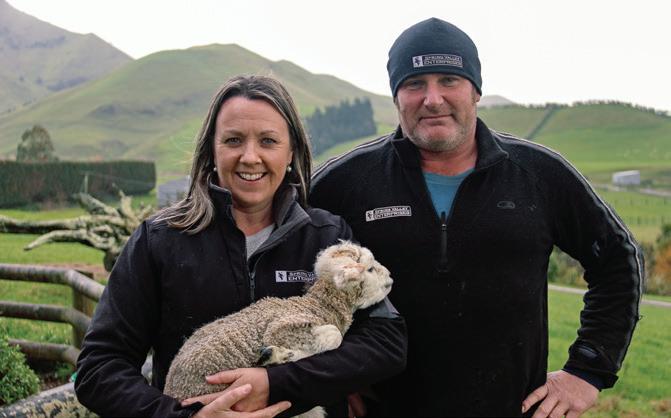
3 minute read
Traceability closes the loop for meat customers
Wairarapa farmers Matt and Lynley Wyeth say electronic identification fits well with where agriculture sits in the modern world. “The customer wants to know how that animal was raised and treated and where it lived,” Matt says.
Spring Valley Enterprises is three farms totalling 2,100ha (1,350ha effective) with three managers and other shepherds. The home farm at Spring Valley, Kaituna is just outside of Masterton. The other two farms are at Maranui next door and Ratanui, which is 20km down the road at Mt Bruce. All stock is EID tagged and the business is aligned with Allflex because they’re modern and forward thinking. Matt calls the EID process an “enabler”. “It enables us to get accurate information to make decisive decisions, on time, every time.” Specific onfarm trials have shown less need for animal health spending and cuts other wastage from their business. “We know what does and doesn’t work for us. It’s not necessarily what the EID tagging earns you or makes you but what it saves you.” There’s also the gains achieved because of the competitive nature of their team. “If one guy is doing 320 grams a day and another guy is doing 120, he starts asking the other guy why. Suddenly, they want to step up to another level.” Another successful trial was the use of docking scales 2 years ago after frustration with the EID tags only going on at weaning. “If we didn’t put a tag on until weaning, we didn’t get any information until February. Now we tag in October and it’s easier to plan the farms, feed budgets and to book space in the lead up to Christmas.” Linking the kill information is another level of data. “We can see the different ones being rotationally grazed and set stocked, the ones that had a B12 on the docking board, the ones grazed on plantain or rape, the ones with a prelamb worm drench. We did a check last year on the difference between tape drench and a triple.” Genetic mapping showed the potential of the flock, but Matt says going down to an individual basis will take them to another level of increasing production. “If we were told the hoggets could do 145% scanning but they’re doing 120%, we’re not letting them express their full genetic potential.” The duo also enter awards and competitions. “We don’t enter to win but to see if we’re doing any good on a regional or national scale,” Lynley says. “It’s good for our staff too. We want them to be proud of our land and our stock.”

For further information, contact your Farmlands Technical Field Officer or the friendly team at your local Farmlands store.
























